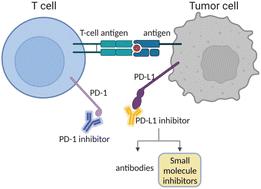当前位置:
X-MOL 学术
›
RSC Med. Chem.
›
论文详情
Our official English website, www.x-mol.net, welcomes your feedback! (Note: you will need to create a separate account there.)
Progress in small-molecule inhibitors targeting PD-L1
RSC Medicinal Chemistry ( IF 4.1 ) Pub Date : 2024-03-04 , DOI: 10.1039/d3md00655g Jindan Xu 1, 2, 3 , Yuanfang Kong 1 , Pengbo Zhu 1, 2, 3 , Mingyan Du 1, 2, 3 , Xuan Liang 1 , Yan Tong 1 , Xiaofei Li 1, 2, 3 , Chunhong Dong 1, 2, 3
RSC Medicinal Chemistry ( IF 4.1 ) Pub Date : 2024-03-04 , DOI: 10.1039/d3md00655g Jindan Xu 1, 2, 3 , Yuanfang Kong 1 , Pengbo Zhu 1, 2, 3 , Mingyan Du 1, 2, 3 , Xuan Liang 1 , Yan Tong 1 , Xiaofei Li 1, 2, 3 , Chunhong Dong 1, 2, 3
Affiliation

|
PD-L1 is a transmembrane protein overexpressed by tumor cells. It binds to PD-1 on the surface of T-cells, suppresses T-cell activity and hinders the immune response against cancer. Clinically, several monoclonal antibodies targeting PD-1/PD-L1 have achieved significant success in cancer immunotherapy. Nevertheless, their disadvantages, such as unchecked immune responses, high cost and long half-life, stimulated pharmacologists to develop small-molecule inhibitors targeting PD-1/PD-L1. After a batch of excellent inhibitors with a biphenyl core structure were firstly reported by BMS, more and more researchers focused on small-molecule inhibitors targeting PD-L1 rather than PD-1. Numerous small-molecule inhibitors were extensively designed and synthesized in the past few years. In this paper, the structural characteristics of PD-L1 and complexes of PD-L1 with its inhibitors are elaborated and small molecule inhibitors developed in the last decade are summarized as well. This paper aims to provide insights into further designing and synthesis of small molecule inhibitors targeting PD-L1.
中文翻译:

PD-L1小分子抑制剂研究进展
PD-L1是肿瘤细胞过度表达的跨膜蛋白。它与 T 细胞表面的 PD-1 结合,抑制 T 细胞活性并阻碍针对癌症的免疫反应。临床上,多种针对PD-1/PD-L1的单克隆抗体在癌症免疫治疗中取得了显着的成功。然而,它们的缺点,例如不受控制的免疫反应、高成本和长半衰期,促使药理学家开发针对 PD-1/PD-L1 的小分子抑制剂。在BMS首次报道一批具有联苯核心结构的优秀抑制剂后,越来越多的研究人员将注意力转向针对PD-L1而不是PD-1的小分子抑制剂。在过去的几年里,许多小分子抑制剂被广泛设计和合成。本文阐述了PD-L1以及PD-L1与其抑制剂复合物的结构特点,并对近十年来开发的小分子抑制剂进行了总结。本文旨在为进一步设计和合成针对PD-L1的小分子抑制剂提供见解。
更新日期:2024-03-04
中文翻译:

PD-L1小分子抑制剂研究进展
PD-L1是肿瘤细胞过度表达的跨膜蛋白。它与 T 细胞表面的 PD-1 结合,抑制 T 细胞活性并阻碍针对癌症的免疫反应。临床上,多种针对PD-1/PD-L1的单克隆抗体在癌症免疫治疗中取得了显着的成功。然而,它们的缺点,例如不受控制的免疫反应、高成本和长半衰期,促使药理学家开发针对 PD-1/PD-L1 的小分子抑制剂。在BMS首次报道一批具有联苯核心结构的优秀抑制剂后,越来越多的研究人员将注意力转向针对PD-L1而不是PD-1的小分子抑制剂。在过去的几年里,许多小分子抑制剂被广泛设计和合成。本文阐述了PD-L1以及PD-L1与其抑制剂复合物的结构特点,并对近十年来开发的小分子抑制剂进行了总结。本文旨在为进一步设计和合成针对PD-L1的小分子抑制剂提供见解。



























 京公网安备 11010802027423号
京公网安备 11010802027423号